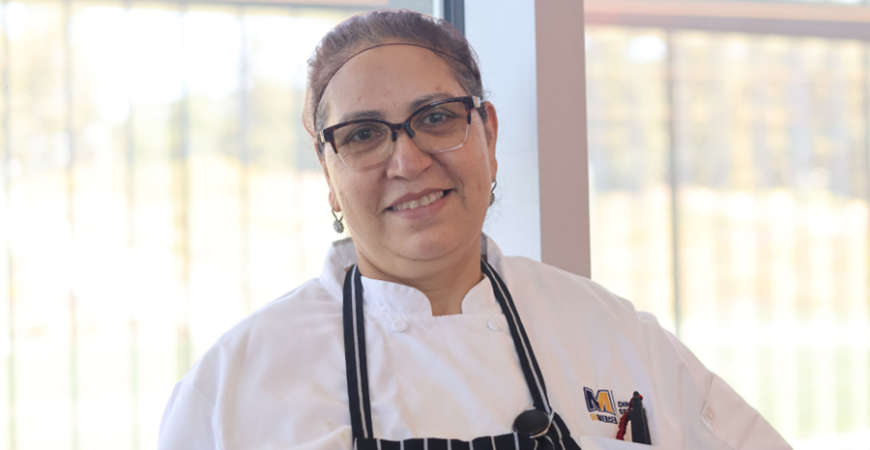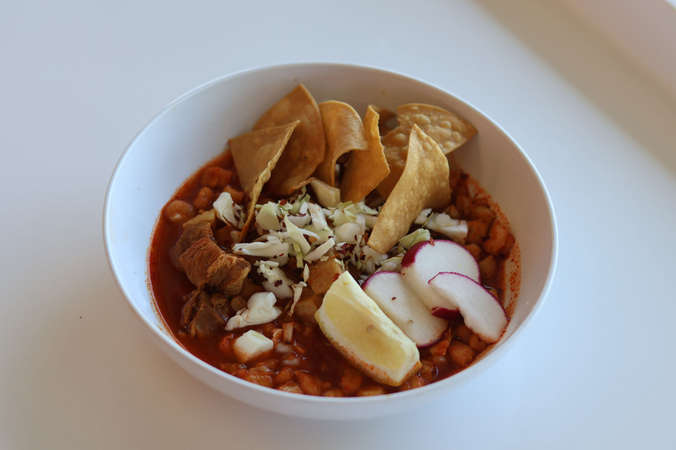
Every Thursday, Chef Maria Maravilla arrives on campus at 5 a.m. In the kitchen, she carefully grinds spices and chops vegetables, both for her special creation and to top it off. She boils 300 pounds of barbacoa before placing all the ingredients into a large kettle.
When the Pavilion Dining Center opens for lunch, about 600 people will get to savor the rewards of Maravilla’s labor: homemade pozole.
Pozole is a traditional Mexican stew made from meat and hominy, topped with lemon, onion, cabbage and radishes. When Maravilla joined UC Merced in November 2005, she was surprised to find the pozole served on campus was made from a box mix and lacked traditional ingredients.
Determined to introduce authentic Mexican cuisine, Maravilla began bringing her own ingredients from home. As the recipe changed and word of mouth spread, more people would show every Thursday.
The recipe came from her mother and highlights the connection between food and culture. She credits Executive Chef Mitchell Vanagten for supporting her efforts and providing all the ingredients and equipment necessary to make authentic pozole.
Maravilla said some students have never tried pozole. She sees cooking as a great opportunity to share her heritage.
Even for those familiar with the dish, she emphasized that the effort and history behind it are often overlooked. Hominy, a key ingredient in pozole, is made by treating dried maize kernels with an alkali in a process called nixtamalization. This practice was vital in early Mesoamerican cuisine. Ground hominy can be used to make masa, which is turned into tortillas, tamales and used in many other Latin American staples.
“I feel a deep sense of pride when people show up on Thursdays,” Maravilla said. “Students often ask who made the pozole, and years later, they still remember me.”

After nearly two decades, Maravilla reflects on many fond memories. One student told their mother that Maravilla’s pozole was better than hers. Some customers have requested refunds when they arrived at the Pavilion and found all the pozole was gone. Staff and faculty frequently ask for her recipes, and former students, now teachers, bring their classes to tour UC Merced. Among her regulars is Chancellor Juan Sánchez Muñoz, who particularly enjoys her vegan pozole.
“If the chancellor is eating your food, you know you’re doing a good job,” she said with a laugh.
Maravilla enjoys connecting with families to address their students’ needs, including expanding the menu to be more inclusive. For example, she now serves a vegan pozole in green sauce, using mushrooms to replace the meat. Maravilla hopes her pozole provides comfort to students dealing with homesickness.
"Students leave their families and feel homesick. It’s the same experience for those who migrate to the U.S. The traditional foods are a comforting reminder of home,” explained Maravilla.
She plans to continue introducing more traditional dishes to the campus menu. Last summer she featured chicken mole and chile relleno.
To celebrate Hispanic Heritage Month, Dining Services has showcased cuisines from El Salvador, Mexico and Peru. Be sure to stop by the Pavilion Dining Center every Thursday from 11 a.m. to 3 p.m. and enjoy Maravilla’s pozole.
See more stories celebrating Hispanic Heritage Month.



